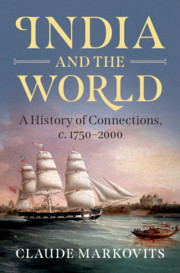Book contents
- India and the World
- India and the World
- Copyright page
- Dedication
- Contents
- Figures
- Tables
- Acknowledgements
- Chronology
- Glossary
- Abbreviations
- Map of India’s Global Connections, 1750–2000
- Introduction
- 1 India in the Global Economy
- 2 India in Global Human Circulations
- 3 India in the World of Wars and Peace
- 4 India in the Global Exchange of Ideas
- 5 India in Global Cultural Circulations
- 6 Indians and Others
- 7 Two Global Indian Events
- Conclusion
- Bibliography
- Index
Conclusion
Published online by Cambridge University Press: 19 March 2021
- India and the World
- India and the World
- Copyright page
- Dedication
- Contents
- Figures
- Tables
- Acknowledgements
- Chronology
- Glossary
- Abbreviations
- Map of India’s Global Connections, 1750–2000
- Introduction
- 1 India in the Global Economy
- 2 India in Global Human Circulations
- 3 India in the World of Wars and Peace
- 4 India in the Global Exchange of Ideas
- 5 India in Global Cultural Circulations
- 6 Indians and Others
- 7 Two Global Indian Events
- Conclusion
- Bibliography
- Index
Summary
I start by considering recent political developments in India, specifically the BJP’s victory at the 2019 Lok Sabha elections, which seems to suggest the durable entrenchment of the Hindu nationalists in power. I relate it to the global history of India as presented in the book and stress that it reveals a degree of continuity with the trends outlined there but also signals a profound break. The continuity is in the ‘global’ aspect of the rise of the Hindu nationalists, which can be related in many ways to the worldwide rise of right-wing populism. A specific manifestation of this right-wing globalism is the closeness between American President Donald Trump and Indian Prime Minister Narendra Modi. But the rise of Hindu nationalism also has another side to it, as it puts forward a vision of India as a Hindu country, tending to erase in particular the Islamic side of India’s history that is so germane to India’s global history. Besides, it promotes a view of India’s history as totally sui generis, ignoring the contributions to India’s historical trajectory of the multiple connections that are at the centre of the book.
Keywords
- Type
- Chapter
- Information
- India and the WorldA History of Connections, c. 1750–2000, pp. 227 - 240Publisher: Cambridge University PressPrint publication year: 2021

